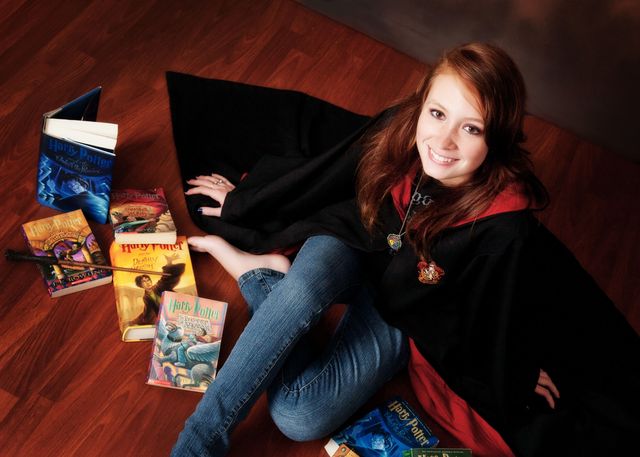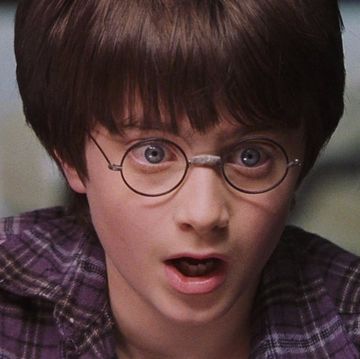"All was well."
Those were the three words that ended the epic 7-part Harry Potter series when the final book was released in 2007. The three syllables brought closure to millions of fans after years of watching our hero, Harry, suffer unimaginable loss.
Flash forward nine years to the first announcement of Harry Potter and the Cursed Child, when fans found out that, actually, all is not well for Harry Potter.
Even though we thought J.K. Rowling had closed the door to the wizarding world, the fandom – me especially – welcomed the new Harry Potter installment with open arms and I pre-ordered it faster than a Firebolt with a nice tailwind.
When I finally got my hands on the play-turned-novel, I actually cried into the crisp new pages – I couldn't believe that after nine years I was finally going home.
As soon as I cracked it open, my excitement deflated. These characters – this world – was nothing like I remembered. It's like J.K. wasn't even a part of the literary process – which, according to the author byline, she wasn't. The bold print clearly states the book was written by Jack Thorne, based on a story he created with J.K. Rowling and John Tiffany – but I still thought J.K. would make sure Harry was done justice.
As I worked my way through the chapters, I got the feeling Thorne didn't read the books thoroughly before writing it. Instead, it seems like he watched two or three movies, then decided to make a farfetched fan fiction based on what he incorrectly thought Harry Potter was.
As a result, the characters aren't true to themselves – it's like Thorne turned the Resurrection Stone thrice in hand and conjured pale imitations of the witches and wizards we love.
Cursed Child-Ron tells jokes, because that's what people who work at joke shops do, don't you know? Draco Malfoy is weirdly affectionate towards the trio he despised. *SPOILER ALERT* Snape is honored that Harry's son is named after him, even though he absolutely despised Harry and anything to do with the Potter name. And Harry can barely have a conversation with his own son, Albus — something I know Harry would never, ever let happen.
Unlike the rest of the Harry Potter books, the entire plot of Cursed Child is random and shallow.
Because he's angry at Harry for a reason that was only lightly touched upon, Albus Potter develops a fixation with Cedric Diggory, which becomes the premise for the entire book. He overhears Amos Diggory talking about his son Cedric's untimely death once (I repeat: ONCE) and suddenly decides that his sole purpose in life is to go back in time and stop Cedric – a stranger who has nothing to do with him and died before Albus was even born – from dying. (Refresher: Cedric accidentally went to the graveyard in Goblet of Fire and was killed by Peter Pettigrew under Voldemort's orders.)
The whole thing leaves me with one question: Why would Albus, who knows nothing about Cedric and has not been effected by his death in the slightest, decide to undergo this random mission to revive him?
Albus gives some feeble excuse about how saving Cedric will make up for the people who died because of their association with Harry, which seems like a disconnected attempt on the author's behalf to invent a dangerous plot line. In the original books, Harry's missions were always 100% necessary (ex: Saving the Sorcerer's Stone from Voldemort, saving Ginny Weasley from the basilisk, saving Sirius from Voldemort, hunting down Horcruxes). But Albus' ridiculously risky decisions could never have a successful outcome, which makes it impossible to root for him. The whole book I was just thinking GO HOME, ALBUS.
Alongside the Cedric narrative, there's a side plot that reveals Delphi, who enters the story as a new friend claiming to be Cedric's cousin, is Voldemort and Bellatrix Lestrange's daughter, making her the 'bad guy.' It's a desperate attempt to create an antagonist and to a die-hard HP fan, it just doesn't ring true. There was nothing in the first seven books that implied Voldemort and Bellatrix had a child, in fact quite the opposite – true Potterheads remember that Bella is married to a fellow Death Eater.
It seems lazy that Thorne opted out of developing a new character and just decided to keep playing off of the Voldemort's-the-villain story line. Since he couldn't believably revive You-Know-Who, Thorne just settled for the next best thing: Voldemort Jr.
There's a scene in Order of the Phoenix where Harry's beloved pet owl Hedwig gets hurt, so Harry is forced to leave her with the Care of Magical Creatures teacher, Professor Grubbly-Plank, for treatment. As the professor walks away with her, Hedwig stares at Harry "as though unable to believe he would give her away like this." And that's exactly how I feel.
I am hurt and angry that J.K. would hand my beloved series away to someone who doesn't even know it or understand it. Thorne didn't grasp that what makes the Harry Potter series a world, and not just a story, is its depth.
In the seven books, three official spin-offs, and countless Pottermore stories J.K. Rowling carefully crafted, each and every plot turn had a rock-solid reason behind it, which often wasn't revealed until four books later. Even now that Harry's story has ended, Potterheads are still finding information about the wizarding world hidden in the tangled web of information J.K. created.
She could have used her own special kind of magic to bring Harry alive again in Cursed Child, but instead she let an outsider conjure up a ghost.
Kelsey is the assistant style editor at Seventeen.com. Follow her on Instagram!

Kelsey is Seventeen.com's fashion expert and resident Harry Potter nerd. At the office, she spends her day writing about style, beauty, and literally every move Kylie Jenner makes. On the weekends, you can find her sifting through vintage shops and hunting for the perfect burger. Follow her on Instagram at @klstieg.













